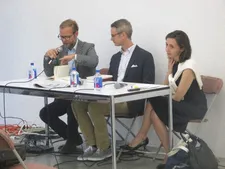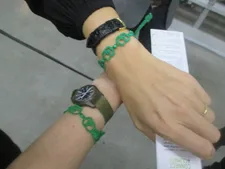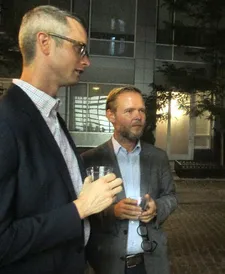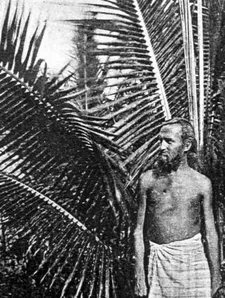 |
| Novelist/screenwriter, Christian Kracht, gives a Paddington hard stare before his conversation on Imperium: A Fiction of the South Seas with Daniel Bowles and Anne-Katrin Titze Photo: David Netto |
Douglas Sirk's penultimate film before emigrating from Germany to Hollywood, La Habanera (1937), with Zarah Leander and Ferdinand Marian battling "Puerto Rico fever", fits right in with the mood of Imperium, throwing geography and time frames to the wind. Jan Ole Gerster, the director of A Coffee In Berlin (Oh Boy!) is attached with Tom Schilling (as South Sea savior of a sort, August Engelhardt) to the filming of Christian Kracht's German best-seller.
In 2013, at the Montréal World Film Festival, Frauke Finsterwalder's Finsterworld, co-written by Christian Kracht, had its international premiere. The first-rate ensemble cast includes Ronald Zehrfeld and Michael Maertens (both starring in Christian Petzold's latest, Phoenix), Margit Carstensen (of Rainer Werner Fassbinder fame), Sandra Hüller, Bernhard Schütz, Corinna Harfouch, Christoph Bach, Jakub Gierszal, Carla Juri, Leonard Scheicher, Max Pellny and Dieter Meier.
 |
| Christian Kracht reading from his latest novel Photo: Océane Francioli |
On the occasion of the US publication of Imperium: A Fiction Of The South Seas, published by Farrar, Straus and Giroux, the author read from his fourth novel. This was followed by a conversation with the English translator, Daniel Bowles, at the Swiss Institute in New York.
I lifted anchor with a quote by Oscar Wilde from 1891: “A map of the world that does not include Utopia is not worth even glancing at, for it leaves out the one country at which Humanity is always landing. And when Humanity lands there, it looks out, and, seeing a better country, sets sail."
Anne-Katrin Titze: Would you say that August Engelhardt, yours or the real one, would have been aware? Would he agree?
Christian Kracht: Aware of Oscar Wilde? I don't really think so. Engelhardt is in my book and perhaps also the real Engelhardt is something of a guileless fool. Things happen to him. He reacts. He does not act. It's a beautiful quote but I think Utopias are destined to become problematic as soon as they are set up. Of course, the longing is alright but as soon as you add hierarchical structures to a Utopia, they tend to go awfully wrong. In this book, they turn out to be very bad in the end.
AKT: In his preface to The Portrait Of A Lady, Henry James mentions what Turgenyev said to him, that fiction begins with the vision of some person or persons who "hovered before him, soliciting him". When did August Engelhardt solicit you?
 |
| Connect4Climate bracelets in conjunction with Film4Climate Photo: Anne-Katrin Titze |
CK: He solicited me at a yard sale. I came across his photograph. There are two or three still in existence. You can look him up. It's quite a stunning image of him standing under a palm tree, in fact, with Max Lützow, another figure in my book. There's a postcard that he had printed in Australia and had sent to Germany to attract followers to his sect. So this picture summoned me. You know, he had a long beard and extraordinarily long hair. It looked completely out of time. Or the wrong time - more like a late Sixties, early Seventies image. And then I had to find out more. Nothing was known about him until a couple of years ago. And progressively, I wanted to shed light on him.
AKT: Did you, Danny, know of Engelhardt before translating the book?
Daniel Bowles: This was my first encounter with Engelhardt, with the book itself. Tracing some of the references was quite a scavenger hunt. Looking into the pamphlets he had written, for example A Carefree Future. I didn't read all of it. It's a bit…
CK: … one of many crackpot pamphlets that were printed around this time.
AKT: Was A Carefree Future ever translated into English?
DB: Not to my knowledge, it hasn't been. It's not particularly long. It's a hundred pages or so.
CK: In it he extolls the wonderful medicinal properties of the coconut. And then you need only live on this ingenious fruit and all your ills will disappear. In my book he doesn't go on a Christian tangent but in real life he was turning rather devout and combining it with this sort of Lutheran sensibility.
 |
| Finsterworld director/screenwriter Frauke Finsterwalder with Anne-Katrin Titze in SoHo Photo: Océane Francioli |
AKT: Your publishers tweeted to bring your own coconut, so I brought one. So that we can all look at this godly fruit while we are talking.
CK: Oh thank you for bringing this. This is a very small one, actually. You see that Engelhardt's idea was that it grew closest to the sun, highest in a palm tree and that it is closest to God of all fruits. And it resembles the human head in that it has hair. [Christian strokes the hair of the coconut at this point].
DB: There is a wonderful moment in the novel when he encounters a Tamil, a vegetarian, on the train, who expresses some interest in his ideas. And this is when he learns, he makes this comparison between the consumption of coconuts and the devouring of God. This is a kind of turning point in a sense for Engelhardt in his understanding. It is also a kind of sinister turning point as well in his trip down the road to madness.
CK: That's true, but he also sees this as sacrament - the blood and body of Christ.
AKT: At the same time, there is something quite childlike about Engelhardt. Reading the novel in German, there were places where a whole universe is encapsulated in a word or a turn of phrase. I am thinking of the choice of "Kindlein", followed by "niemals zurückkehren, nimmermehr." There is a rhyme of German innocence lost that is tough to get into English. Can you talk a little about that?
 |
| Daniel Bowles and Christian Kracht reflecting on the Swiss Institute |
DB: Well, the narrator himself adopts this kind of archaic tone. We discussed a bit the placement of the narrator in the timeline, in the events around the early twentieth century when the story is taking place. But the narrator is telling the story in hindsight but adopting a tone of that time. So to get these references you have to dig through the history of the English language to find similar archaisms, that have a similar resonance, I would say, with a readership. Finding something that's going to be a one to one correspondence is not possible but you approximate.
CK: It's interesting because the passage you mentioned is a song, an old East-Prussian ditty and those are of course increasingly impossible to approximate. That does go in some direction of trying to define a certain - the word was used yesterday - Teutonic trope. Approximating something through language that is almost impossible to translate.
AKT: You have Engelhardt in Imperium imagine a parallel world as a child. So does the novel itself in a way. You have a version of Thomas Mann, Franz Kafka, Husserl, Einstein, Freud, Hitler, the brothers Kellogg interact with characters from Hugo Pratt's Corto Maltese. There is Joseph Conrad, Daniel Defoe, E.M. Forster floating in the air. Nabokov adds some synesthesia, dachshunds and characters from Pnin. What fits best in your mind? Do you see it as a palimpsest, a Möbius strip? Is it mise en abyme? Is Imperium all of the above?
CK: Ideally you don't have to get all those inside little things. You know, ideally you just read it as an adventure yarn. If one can do that. Thanks to your marvelous translation, Danny, I think it is possible. Those things are in there… I wouldn't call it a mise-en-abyme. I just happen to like Mann. And then at one point, when Mann actually does show up in the book, I emulate, sort of pastiche his tone.
AKT: I felt the presence of Mann already in the first sentence, in the deck chairs. Although we are in the sunshine of the South Seas and on a boat, I got the feeling of Magic Mountain camel hair blanket wraps being prepared.
 |
| Imperium's biggest fan, little Queen Emma, contemplates being a cocovore Photo: Anne-Katrin Titze |
CK: Right, there is that. Also because of the Porter beer which is the kind that Hans Castorp liked.
At this point, Danny reads the Thomas Mann episode in German, followed by Christian's reading of the English translation - which is actually one enormously long sentence.
CK: This is Danny's work and really well done. Thomas Mann in English is quite unreadable. It's fun in German.
DB: There is a rhythm to the sentence in German. I think part of the difficulty in translating this - and also part of the joy - is trying to find and identify a similar rhythm in English. I hesitate to use the word musicality but there is a kind of musical element to finding moments when you can take a breath. So that you don't end up breathless halfway through.
AKT: Legend has it that Picasso refused to discard any of his nail clippings, ever, and that he kept all of them.
CK: Do you know where he kept these?
AKT: I don't know. They might still be in a drawer. From thumb sucking - at a very advanced level - scab eating, toenail snacking to also in your film Finsterworld with Frauke [Finsterwalder] where you have foot shaving cookies, there is a lot there. Speak about the body as snack!
 |
| August Engelhardt: "he had a long beard and extraordinarily long hair. It looked completely out of time. Or the wrong time - more like a late Sixties, early Seventies image." |
CK: There is this fascination with sort of disgusting things, little bit disgusting things. There is this other image of the earwax, which is completely ridiculous in the book, that falls out of his ear and dyes his garment yellow. I don't know. I like writing about things like that. It's a childlike fascination with boogers and these sort of things. So, of course, in the course of this book this points to much more horrible things that will follow.
AKT: Do you like to translate things like that? [Earwax on film makes me think of Paddington].
DB: I grew up with two brothers and part of the joy of growing up with them was competing in gross-out contests. So this is in a sense evocative of my childhood. Do I enjoy it? I like how it fits in with the rest of the novel. Also it's kind of jargon, especially with the narrator's arched tone, it stands out as utterly absurd and really makes me laugh every time.
AKT: The following sentence gives the reason why Engelhardt is leaving Germany: "And his resolve is steeled what he will do is say adieu forever to this poisoned, vulgar, cruel, hedonistic society rotting from the inside out, a society whose sole occupation consists in amassing useless things, slaughtering animals, exterminating the soul." Things have changed completely, haven't they?
CK: Plus ça change… I think that's a very modern sensibility that is the foundation of Utopia. That's when he goes out to found this sect. He is just disgusted with Toys"R"Us and Starbucks.
AKT: And here we are full circle to Utopia…. In the novel, there is a lot about time. Skipping and jumping.
CK: Rewinding!
AKT: Precisely. Analepsis and prolepsis. There is a clock with a grain of sand and in the end the hero not only gets a coke and a hotdog, but also a wristwatch. This gives the reader a wonderful sense of freedom about time.
CK: Thank you. Well, of course time is also a character in the book. We do move back and forth. Especially filmic time is used several times. The fact that the first sentence of the book is also the last sentence of the book creates this loop, this Möbius strip which also recalls the endless repetition, things that come in circles.
Christian told me that Australia is one of the locations being considered by the production team for Jan Ole Gerster's film adaptation of Imperium.
The latest New York Times Book Review will feature Imperium: A Fiction of the South Seas.
Christian Kracht will return to New York on September 20 for the Brooklyn Book Festival.
Imperium: A Fiction Of The South Seas is an unforgettable cinematic feast for the soul, offering up a dazzling gaze into grand adventures and dangerous desires.





















